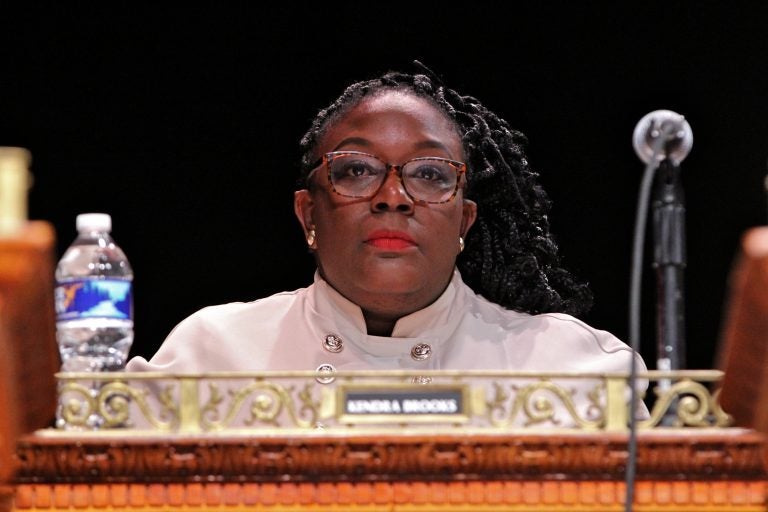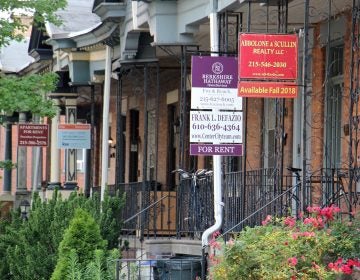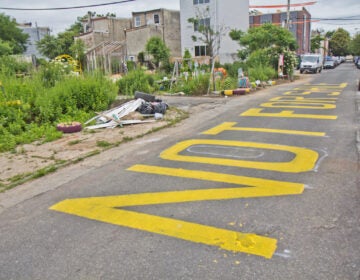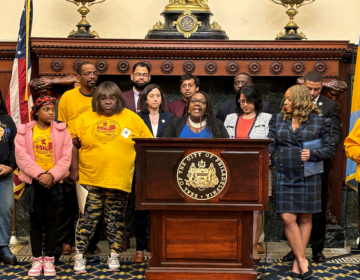Aiming to ‘protect renters’, Philly Council limits landlords’ use of eviction records
A bill passed by City Council limits landlords from denying housing because of eviction records. The Philadelphia bill could have broad impacts.

Philadelphia City Councilmember Kendra Brooks. (Emma Lee/WHYY)
Philadelphia City Councilmember Kendra Brooks’ push to limit landlords use of tenants’ eviction records passed City Council Thursday 16-1. Councilmember David Oh was the lone opposition.
“Just like the job application process, every person has the right to be fairly evaluated when applying for rental housing,” Brooks said. “As Philadelphians recover from the devastating impacts of the pandemic, these bills will ensure everyone has a fair chance at securing housing. With these bills, Philadelphia is continuing to set a nationwide precedent in protecting the rights and dignity of renters.”
The pair of bills called the Renters’ Access Act, originally introduced in April, would prohibit landlords from denying housing based solely on eviction records and require them to let tenants know why they are denied. Landlords must also provide written rental screening criteria to prospective tenants. Under these new rules, landlords also cannot deny a tenant solely because of credit scores or an eviction record that is more than four years old. They also prohibit denying a tenant housing because of their inability to pay rent or utility bills during the COVID-19 emergency period.
The legislation is cosponsored by Councilmembers Bobby Henon, Jamie Gauthier, Helen Gym, and Isaiah Thomas. It also has the support of Community Legal Services of Philadelphia and the SeniorLAWCenter.
During the pandemic, 78% of eviction filings in Philadelphia occurred in communities of color, with 49% of them occurring in majority-Black communities. Eviction records follow people and often result in the loss of housing-subsidy vouchers and ineligibility from other public housing programs. In addition, people with eviction records are often screened out of private housing.
Not all eviction filings end with a judgment, but that’s not always reflected in records. Before the pandemic, Philadelphia was averaging about 20,000 filings per year. About a quarter of filings between 2015 to 2020 did not result in a judgment against the tenant.
“The pandemic has significantly exacerbated difficulties facing Black communities and other communities of color, seniors, people with disabilities, and LGBTQ+ people. These populations are most likely to have lost income during the pandemic, putting them at risk of eviction filings, and therefore putting them at risk of homelessness and instability beyond the pandemic,” said Rasheedah Phillips, Managing Attorney of Housing Policy at Community Legal Services of Philadelphia.
Advocacy groups also see this as a win for older adults.
“Over the past few years, SeniorLAW Center has represented a number of clients who should never have had an eviction case filed against them, or who have won at trial,” said Daniel Hyman, Tenants’ Rights Attorney at SeniorLAW Center. “These seniors now have a permanent, public record showing that they have had a dispute with their landlord and will be screened out of other housing opportunities through no fault of their own. Other seniors are afraid to complain about bad landlords who refuse to make repairs because they are afraid of an eviction filing that will follow them for life. We should make it easier, not harder, for our older population to find housing.”
Subsidized housing providers are exempt from most requirements because they must already adhere to federal and state guidelines that dictate their funding.
Brook worked with the Pennsylvania Apartment Association and as a result, the main amendments added included removing the presumption of a violation, allowing landlords to use eviction histories up to four years, and increasing the time for landlords to provide a rejection from two to three business days.
Andre Del Valle, the Pennsylvania Apartment Association’s Director of Government Affairs, said the compromise was workable for the group’s members.
“We are at a place where we can live with the bill and we want to continue to be at the table to work through the regulation process and work on implementation over the next couple of months,” Del Valle said.
The law includes an 18-month evaluation period with stakeholders to make sure the law will be working as intended. This will provide Council to decide whether or not the legislation will need to be adjusted, especially as eviction sealing efforts move forward at the state level.
The other landlord association, the Homeowners Association of Philadelphia (HAPCO) continues to oppose the bill.
“This is a backdoor attempt to get a sealing bill through the city of Philadelphia [and] the city doesn’t have the right,” Paul Cohen, HAPCO’s general counsel said.
Cohen also feels landlords have been consistently targeted when other industries like car and mortgage companies are allowed to base decisions on credit and delinquent histories.
“Why is it only landlords who are being singled out this way? It’s not right,” he said.
Brooks admits that she supports eviction sealings on the state level but rejects that this bill does that. She said this is about giving renters a fair shot at finding housing and encouraging landlords to examine potential tenants holistically rather than relying on incomplete information.
“The Renters’ Access Act reforms the rental application and tenant screening process to increase transparency and accountability while reducing discrimination,” Brooks said. “It does not create a process for eviction sealing, which would have to pass at the state level, but if such legislation were to take effect, these bills would accommodate that change.”
The bill will now move to the Mayor’s Office to be signed into law.
 WHYY is one of over 20 news organizations producing Broke in Philly, a collaborative reporting project on solutions to poverty and the city’s push towards economic justice. Follow us at @BrokeInPhilly.
WHYY is one of over 20 news organizations producing Broke in Philly, a collaborative reporting project on solutions to poverty and the city’s push towards economic justice. Follow us at @BrokeInPhilly.

Subscribe to PlanPhilly
WHYY is your source for fact-based, in-depth journalism and information. As a nonprofit organization, we rely on financial support from readers like you. Please give today.









